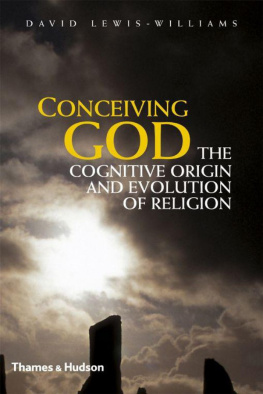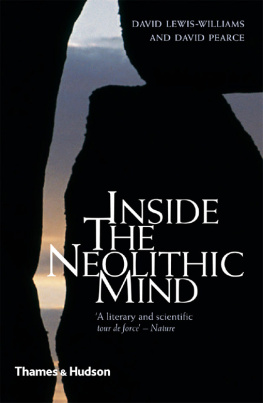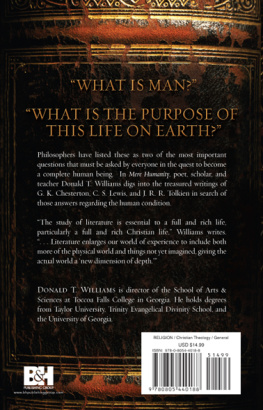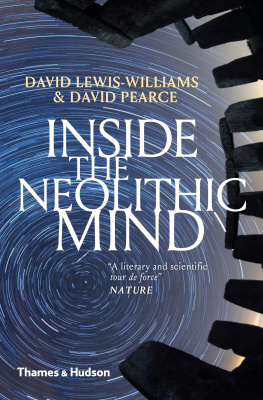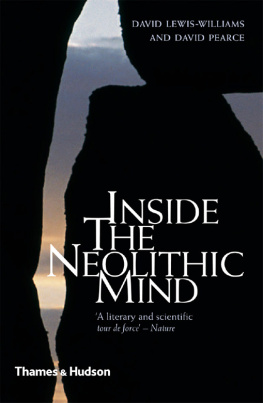DAVID LEWIS-WILLIAMS
Conceiving God
THE COGNITIVE ORIGIN AND
EVOLUTION OF RELIGION

Copyright 2010 Thames & Hudson Ltd, London
This ebook edition first published 2011
First published in the United Kingdom in 2010 by
Thames & Hudson Ltd, 181a High Holborn, London WC1V 7QX
www.thamesandhudson.com
First published in 2010 in the United States of America by
Thames & Hudson Inc., 500 Fifth Avenue, New York, New York 10110
www.thamesandhudsonusa.com
Lines quoted from T. S. Eliots poem The Love Song of J. Alfred Prufrock are reproduced by permission of the publishers, Faber and Faber Ltd.
All Rights Reserved. No part of this publication may be reproduced or transmitted in any form or by any means, electronic or mechanical, including photocopy, recording or any other information storage and retrieval system, without prior permission in writing from the publisher.
ISBN for USA and Canada: 978-0-500-77043-6
UK and the Rest of the World outside North America: 978-0-500-77032-0
... throughout the world
Impious war is raging.
VIRGIL, GEORGICSI.510511
And we are here as on a darkling plain;
Swept with confused alarms of struggle and flight,
Where ignorant armies clash by night.
MATTHEW ARNOLD, DOVER BEACH
[B]e ready always to give an answer to every man that
asketh you a reason of the hope that is in you with
meekness and fear.
1 PETER 3:15
Preface
It appears to me (whether rightly or wrongly) that direct arguments against Christianity and theism produce hardly any effect on the public; and freedom of thought is best promoted by the gradual illumination of mens minds which follows from the advance of science. It has, therefore, been always my object to avoid writing on religion, and I have confined myself to science.
No evidence is powerful enough to force acceptance of a conclusion that is emotionally distasteful.
In 1880, Charles Darwin wrote the first of these quotations to the British socialist Edward Aveling. In the second quotation, written some 60 years later, Theodosius Dobzhansky acknowledged the difficulty of getting people to change their minds about some immensely important things.
These epigraphs may seem a depressing start to a book such as this, but both writers were correct. Today, in the current science versus religion controversy, we see the publication of numerous books filled with arguments designed to show that humankind would be better off without religion. The reasoning in these publications is often rigorous and inescapable; we need such books. Yet whether they have any impact on the thinking of religious people is doubtful. Perhaps some do. And that is why I have somewhat reluctantly decided to address some key, indeed unavoidable, logical issues. Still, it seems clear to me that the gradual advance of scientific knowledge over the last three and more centuries has done better than logical arguments against supernaturalism: it has led to Darwins freedom of thought.
My own experience has tended to confirm Darwins lack of faith in direct arguments against Christianity and theism. I did not wrestle with arguments and then, after much intellectual agonizing, come to the conclusion that, logically, there is no such thing as a supernatural realm and consequently no such thing as God, a Devil, angels, divinely inspired books, miracles, and so forth. Instead, over the years I pondered the long history of religion. In particular, I thought about the implications of the earliest archaeological evidence for religion. It seems indisputable that Upper Palaeolithic people who lived in France and Spain from about 45,000 to 10,000 years ago believed in a supernatural realm and spirit beings whom they tried to contact. They therefore clambered and crawled to a nether world deep inside caves. There they made images of supernaturally powerful spirit animals. Was the God of present-day monotheistic religions trying to get through to these ancient hunters? Or were they struggling to come to terms with something quite different, something going on in their own brains? And so it was through the ages, through the classical civilizations of Greece and Rome, through medieval times and up to the present day. People seem always to have believed in two domains: the material world in which they conduct their daily lives and a spirit realm that they try to contact.
Then I found it salutary to explore social (cultural) anthropology. People live in vastly different societies with different economies, social structures and, of course, religions. There were (and still are) those who believed that God wanted them to sacrifice other people; those who believed that God wanted them to kill animals by bleeding them to death; those who believed that stubborn infidels should be killed; those who claimed that special people could float up into the sky; those who believed that they should cause, by whatever means necessary, other people to accept their religion. For all these people, their own beliefs were divinely revealed and therefore beyond discussion or evaluation. Famine, fire and sword have been religions dogs of war for so long that there are now many who doubt the possibility of tolerance between major religions. As we look over this sorry tapestry, we must face a fundamental question, one that many today, believers and nonbelievers alike, try to avoid: Is there really a spirit realm occupied by supernatural beings and forces that are concerned with human life on earth? By contemplating the history of religion and science we are able to answer that question in a way that gradually leads to freedom of thought.
Half a century ago, it seemed that politics was the dangerous dividing factor in the world. Democracy, fascism and communism contended for (in an awful modern clich) the hearts and minds of the worlds people not to mention economic wealth. Today, many speak of an impending clash between the Christian (or post-Christian) West and Islam. They realize that religion, rather than politics, lies at the very root of the matter, but they feel that they dare not say so. In trying to dodge the issue, they claim that all religions are fundamentally and intrinsically good; freed from fanaticism, diverse religions will eventually come to live in contented harmony with one another. Ecumenical, multi-cultural, dialogue and inter-faith are the key buzzwords.
If all religions are equal, why, we must ask, did the Christian Church spend so many centuries spreading its gospel throughout the world, hunting down heretics, and waging religious wars? Is it conceivable that, for most of its history, the Church was founded on an error? If each religion, not just Christianity, believes that it is a recipient of supernatural intimations, can we really expect them to cease proselytizing? Belief in supernaturally revealed knowledge is fundamentally incompatible with the equality of all organized religions. This gloomy thought is, however, best kept out of sight: to express it is to court accusations of defeatism, moral blindness, incitement to violence, and much else.
Viewing current conflicts from the perspective of an immense past means that you do not see features of present-day religion and the strife that it brings as the product of a few hundred (or even two thousand) years of history. Instead, you see continuities that seem to be independent of history, that are so deep-seated that they cannot merely be products of specific historical events and processes. The long view shows that there are underlying currents that point to something innate in human beings, something that from at least Upper Palaeolithic times has produced what we recognize as religion.

